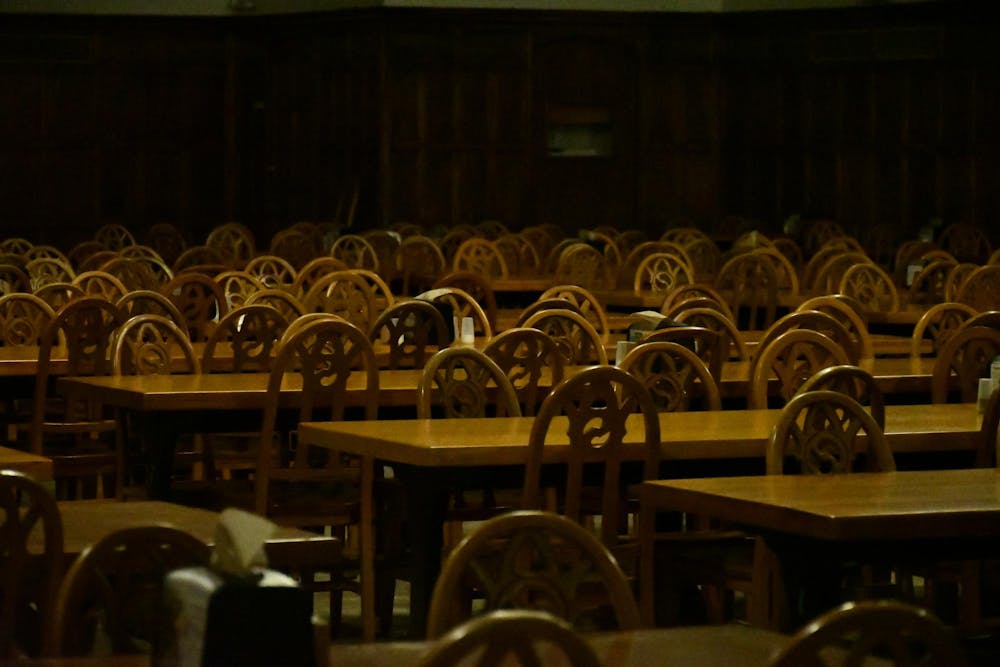It sucks to feel alone in a crowded room, but that’s college for you.
As one YikYak user said in a post with 72 upvotes last Sunday, “Why does no one talk about how incredibly lonely college is?”
You attend class each day with hundreds of fellow students, eat lunch in the dining halls, take a shower in your communal bathroom and fall asleep in a room shared with a roommate. But even when you’re constantly surrounded by people, you can still feel isolated.
A lot of students feel lonely and homesick during their first few weeks on campus as they move away from home for the first time and are immersed in a whole new life at Notre Dame. Many of us spent Welcome Week crying alone in our dorm rooms. But what happens when that feeling persists past the first week of freshman year?
According to the 2022 Inclusive Student Survey, 82% of students who responded to the survey reported they felt a sense of belonging at Notre Dame, while 18% reported being neutral or disagreed that they felt a sense of belonging. One out of four students said they have seriously considered leaving Notre Dame.
Many college students have reported feeling lonely, and this trend was exacerbated during the COVID-19 pandemic. A study from 2020 found that 20-48% of adolescents and young adults report severe levels of loneliness. Post-COVID-19, rates of loneliness are dropping overall, but young adults and college students are still reporting alarming levels of isolation.
It’s a private problem, but we’re writing about it in The Observer because loneliness is a public issue.
Studies have shown feeling lonely can be harmful to your health, increasing blood pressure and stress levels while suppressing the immune system. However, we hardly need to cite studies here: students today know the toll that loneliness can have on our mental and physical well-being — we universally experienced it first-hand during the pandemic.
Loneliness may even threaten our democracy. As recent Notre Dame speaker Robert Putnam may have it, a healthy democracy runs on strong social capital, in which citizens of a nation are involved in their communities through various associations and groups. Feelings of belonging bind our society together.
To Putnam, it doesn’t matter if you join a human rights campaign or your local bowling association. It’s a matter of great importance to just get involved: “This country needs a moral reawakening,” he told his Notre Dame audience. “We owe it to each other.”
On the tri-campus, we strive to build social capital and stoke democratic dialogue, but sometimes when trying to maximize these opportunities, we miss the whole point. People are lonely, and the cure starts small. It can begin with something as simple as lunch. When we use the term civil society, we think of academic research when maybe we should really be thinking of a meal swipe.
At Notre Dame, there are countless opportunities to get involved in civil society. But no matter what you’re interested in, everybody needs to eat.
When it’s rush hour at the dining hall, eating alone at one of the communal-style tables can sometimes make you feel like the loneliest person in the world. It’s easy to feel alone in a crowded room — when you actually are.
While some eat alone of their own volition, grabbing a quick meal between classes or extracurriculars, we should remember what those shared spaces are there for.
“The communal tables help students connect with each other during meal periods and increase fellowship,” writes Experience Notre Dame assistant director Molly Di Carlo. “Breaking bread with fellow students nourishes mind, body, spirit and aligns with the University's mission.”
Let’s combat loneliness by breaking bread together. If you just ask someone in your dorm or a class out to lunch, you might be surprised how likely they are to say yes.










